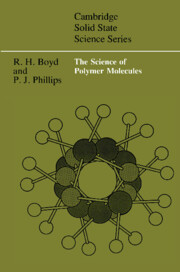Book contents
- Frontmatter
- Contents
- Preface
- 1 Polymerization: an overview
- 2 Molecular weight and molecular weight distribution
- 3 Molecular weight determination
- 4 Polymerization: kinetics and mechanism
- 5 Three dimensional architecture: conformation and stereochemical configuration
- 6 The statistical behavior of conformationally disordered chains
- 7 The interacting bond model for the average properties of coiling chains
- 8 Rubber elasticity
- 9 Solutions
- References
- Index
4 - Polymerization: kinetics and mechanism
Published online by Cambridge University Press: 29 October 2009
- Frontmatter
- Contents
- Preface
- 1 Polymerization: an overview
- 2 Molecular weight and molecular weight distribution
- 3 Molecular weight determination
- 4 Polymerization: kinetics and mechanism
- 5 Three dimensional architecture: conformation and stereochemical configuration
- 6 The statistical behavior of conformationally disordered chains
- 7 The interacting bond model for the average properties of coiling chains
- 8 Rubber elasticity
- 9 Solutions
- References
- Index
Summary
Although the overall chemistry of a polymerization might be obvious in terms of monomers used and polymer produced, this knowledge does not ensure that the details of the chemistry are understood. Polymerizations, especially chain polymerizations, can have a number of intermediate steps that lead to the final result. These intermediate steps or mechanism need to be known if the polymerization itself is to be fully understood. The kinetics associated with polymerization are the principal manifestation of the mechanism underlying the overall chemical process. If a specific polymerization mechanism is proposed then the kinetic equations that ensue from the mechanism should lead to relations for the progress through the polymerization of observables such as the rate of monomer consumption and molecular weight build-up that are in agreement with experiment. If it is desired to have control over the polymerization process in the sense of being able to manipulate results such as molecular weight and its distribution, rate of polymerization, or composition in copolymerizations, then it is highly desirable to have a successful mechanistic and kinetic formulation of the process that expresses the effects of the possible variables.
Step polymerization
The description of the kinetics of step polymerization is greatly simplified if it is realized that the reactivities of the as yet unreacted end groups (carboxyl, amine, etc.) are not sensitive to the length of the chain to which they are attached.
- Type
- Chapter
- Information
- The Science of Polymer Molecules , pp. 96 - 154Publisher: Cambridge University PressPrint publication year: 1993

